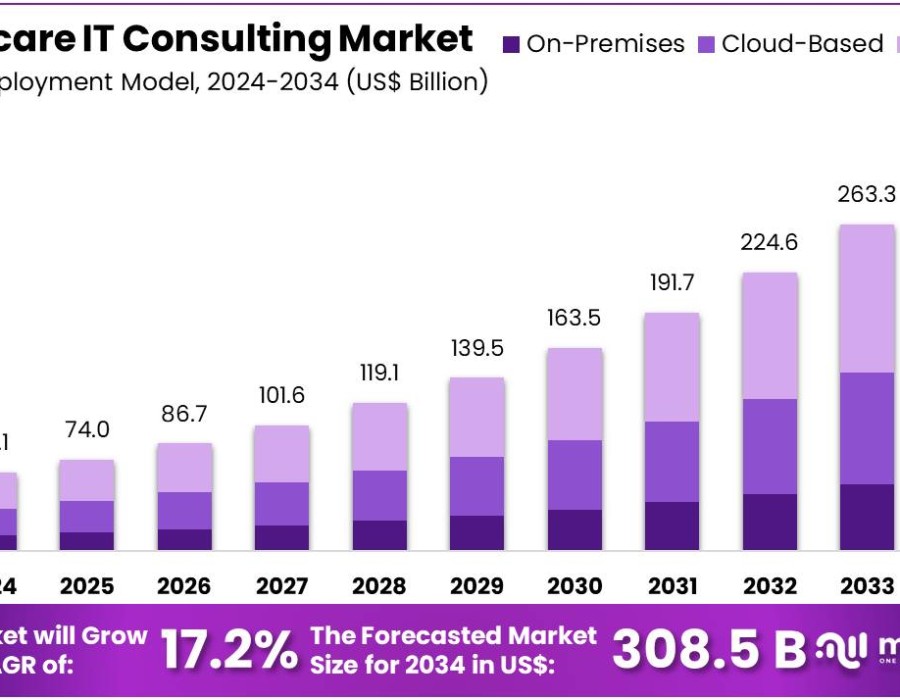The Global Healthcare IT Consulting Market is projected to grow from US$ 63.1 billion in 2024 to US$ 308.5 billion by 2034, with a robust CAGR of 17.2% from 2025 to 2034. This growth is driven by strong government support for digital healthcare, including funding, policy reforms, and legal mandates encouraging the shift from paper to digital records. The rise of telemedicine and virtual care is another key factor, with IT consultants playing a vital role in ensuring these platforms are secure and well-integrated into existing systems. Data privacy regulations like HIPAA and GDPR are also fueling demand for cybersecurity consulting, as healthcare providers seek to protect sensitive patient information. Additionally, there is growing adoption of AI, machine learning, and data analytics to improve clinical outcomes and reduce errors. Healthcare IT consultants are essential in guiding the deployment of these technologies and achieving seamless system interoperability.
![]()
Key Takeaways
- In 2024, the global healthcare IT consulting market earned US$ 63.1 billion, projected to reach US$ 308.5 billion by 2034 at 17.2% CAGR.
- The Healthcare Business Process Management segment led by type, capturing 26.3% of the market share in 2024.
- Among deployment models, the Hybrid model held the top position in 2024 with a 45.4% revenue share.
- Healthcare Providers emerged as the leading end-users in 2024, contributing 69.6% to the total market share.
- Regionally, North America dominated the global healthcare IT consulting market with a 39.8% share in 2024.
Challenges
- Cybersecurity Risks: Healthcare systems handle very sensitive patient information. When this data is not properly protected, it becomes a target for hackers. Many healthcare providers use old systems that are easy to break into. Consultants face a big challenge in making these systems safe and secure.
- Complicated Rules and Compliance: Different countries have their own rules for managing health data. In some places, these rules keep changing. Healthcare IT consultants need to stay updated with new laws and help clients stay compliant, which can be time-consuming and complex.
- High Costs of Technology: Modern healthcare IT systems are expensive to set up and maintain. Hospitals and clinics may not have large budgets. Some are also unsure about the return they will get from investing in new systems. This makes decision-making harder.
- Lack of Skilled Professionals: There is a shortage of people who are trained in both healthcare and advanced technologies like AI, data analytics, and cloud systems. This makes it difficult for healthcare providers to get the support they need to fully use IT services.
- Resistance to Change: Many healthcare workers prefer traditional ways of working. They may not easily accept new technologies or systems. Consultants need to plan effective training and communication strategies to help staff adapt to these changes.
Opportunities
- Growth of Telehealth: Remote healthcare services are becoming more popular, especially in rural areas. Patients now want easier access to doctors through digital platforms. Consultants can help hospitals build and improve these telehealth systems.
- Use of Artificial Intelligence: AI can help doctors diagnose diseases faster, predict health risks, and improve patient care. However, hospitals need expert advice to implement AI in a safe and effective way. This creates strong demand for IT consultants.
- Cloud-Based Solutions: Hospitals are moving their data and systems to cloud platforms. Cloud storage offers better security, easier access, and cost savings. IT consultants can guide this digital shift and help manage the process safely.
- Mergers and System Integration: When two healthcare providers merge, their IT systems often don’t match. Consultants play a key role in combining data, tools, and processes into a single, working system. This improves both efficiency and care quality.
- Focus on Data-Driven Healthcare: Hospitals are using data to make better decisions and offer personalized care. Consultants who can help set up data systems, dashboards, and reporting tools are in high demand.
Conclusion
The healthcare IT consulting market is growing fast as hospitals and clinics move towards digital systems. Support from governments, rising use of telehealth, and the need for strong data protection are key reasons for this shift. At the same time, healthcare providers face challenges like high costs, complex rules, and staff resistance to new technologies. Still, there are many opportunities ahead. As cloud systems, AI, and data analytics become more common, the need for expert consultants will continue to rise. With the right guidance, healthcare organizations can improve patient care, stay secure, and keep up with the digital age. This makes IT consulting a valuable part of modern healthcare.





Comments